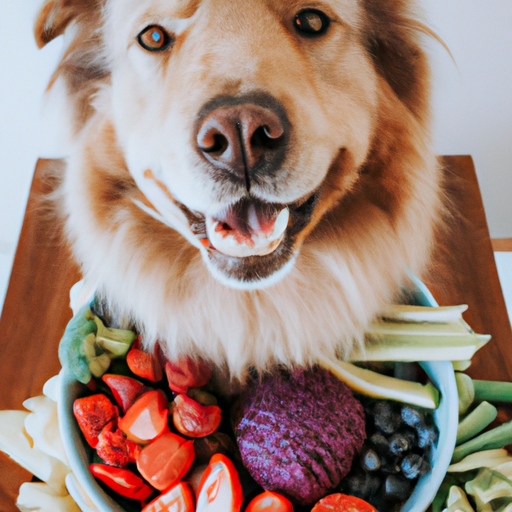As a caregiver to your fur baby, you want to ensure that your dog is getting the best possible nutrition. But figuring out what dogs can eat can be a tricky task. This guide will help you understand what foods are safe for your canine friend and which ones are not.
Table of Contents
- Meat and Fish
- Fruits and Vegetables
- Dairy and Eggs
- Grains and Legumes
- Nuts and Seeds
- Foods to Avoid
- Human Foods that are Beneficial
- FAQ
Meat and Fish
Dogs are primarily carnivores, and their diet should reflect this. The best meats for dogs include:
- Chicken: High in protein and can be easily digested.
- Beef: Rich in essential amino acids, vitamins, and minerals.
- Fish: Especially salmon and sardines are good sources of omega-3 fatty acids and proteins.
Remember to feed these meats cooked and unseasoned. Some seasonings can be harmful to dogs.
Fruits and Vegetables
Though not a significant part of their ancestral diet, fruits and vegetables can be a healthy treat for your dogs. Here are some safe options:
- Apples: High in fiber and vitamin A and C. Make sure to remove the seeds and core.
- Carrots: Good for a dog’s teeth and high in vitamin A.
- Blueberries: A superfood packed with antioxidants.
Avoid feeding your dog onions, garlic, and chives as they can be toxic.
Dairy and Eggs
Dairy products can be a great source of protein and calcium for dogs. However, many dogs are lactose intolerant. Some safe dairy options include:
- Cheese: Especially low or non-fat cheese.
- Plain Yogurt: A good source of calcium and protein.
Eggs are safe for dogs to eat. They are high in protein and contain essential fatty acids and amino acids that dogs need. Feed eggs cooked to avoid the risk of salmonella.
Grains and Legumes
Grains and legumes can be a part of your dog’s diet. Some safe options are:
- Rice: Especially brown rice, can be easily digested.
- Quinoa: A complete protein and good for dogs with dietary sensitivities.
- Lentils: A good source of iron, fiber, and folate.
Nuts and Seeds
Although some nuts, like almonds and walnuts, can be harmful to dogs, others can be healthy in moderation.
- Peanuts: A good source of heart-healthy fats, vitamin B, niacin, and vitamin E.
- Flaxseeds: Rich in omega-3 fatty acids.
Foods to Avoid
Certain foods can be toxic to dogs. Some of these include:
- Chocolate
- Coffee
- Alcohol
- Grapes and Raisins
- Macadamia Nuts
- Avocados
Human Foods that are Beneficial
Some human foods can be beneficial for dogs. These include:
- Pumpkin: Good for a dog’s digestion.
- Sweet Potatoes: High in dietary fiber.
- Green Beans: Low in calories and high in fiber.
FAQ
1. Can dogs eat raw meat?
While some believe in a raw diet for dogs, it’s generally safer to feed them cooked meat to avoid the risk of foodborne illnesses.
2. Can dogs eat bones?
Some bones can be safe for dogs, but others, like chicken and pork bones, can splinter and cause harm.
3. How much should I feed my dog?
The amount to feed your dog depends on their size, breed, age, and health status. It’s best to consult with a vet.
4. Can dogs eat cat food?
While an occasional nibble won’t harm your dog, cat food is not formulated for dogs and lacks the proper nutrients they need.
5. Can dogs be vegetarian or vegan?
With careful planning and vet supervision, dogs can lead a healthy vegetarian or even vegan lifestyle. However, it’s crucial to ensure they’re getting all the nutrients they need.
Remember, every dog is unique, and what works for one might not work for another. Always consult with your vet before making significant changes to your dog’s diet.



